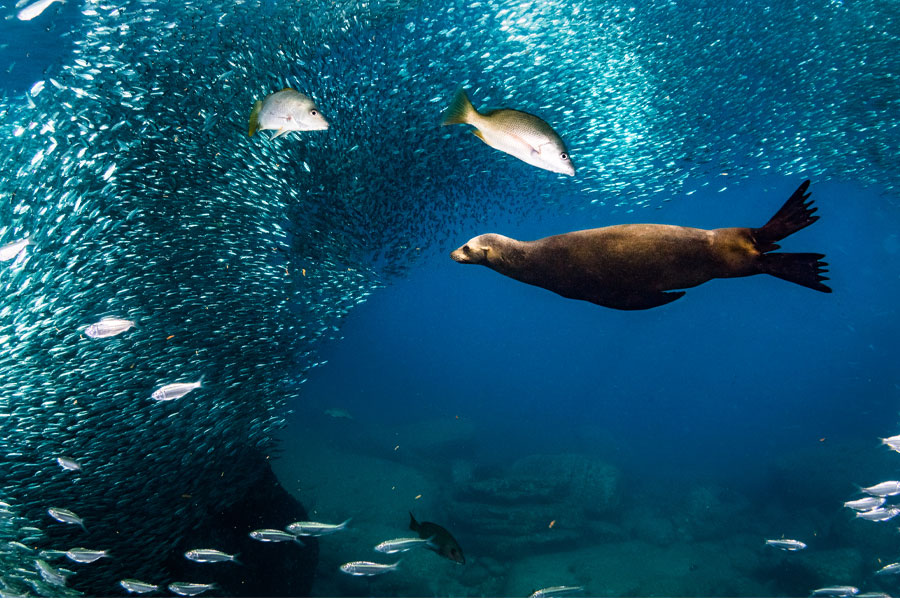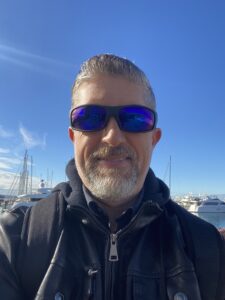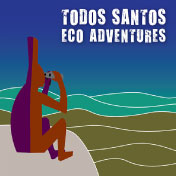
Pesca Con Futuro / Fishing with a Future
Pesca Con Futuro / Fishing with a Future
 When Christian Liñan decided to open his third restaurant in La Paz in 2017, he resolved to work only with 100% traceable, sustainably-caught local seafood. That made his seafood supply chain logistics pretty simple: he bought totoaba from Earth Ocean Farms in La Paz and oysters from Sol Azul in San Ignacio. That was it. “I have at least 15 different recipes for totoaba” he notes.
When Christian Liñan decided to open his third restaurant in La Paz in 2017, he resolved to work only with 100% traceable, sustainably-caught local seafood. That made his seafood supply chain logistics pretty simple: he bought totoaba from Earth Ocean Farms in La Paz and oysters from Sol Azul in San Ignacio. That was it. “I have at least 15 different recipes for totoaba” he notes.
A combination of the pandemic and interminable neighborhood renovation forced the closure of that restaurant, but Christian’s commitment to traceable, sustainably-caught seafood has spanned decades and was not snuffed by a mere change of circumstance. His talent was recognized by COMEPESCA, the Mexican Council for the Promotion of Fisheries and Aquaculture Products, and as of January 2023 Christian is the Baja representative of COMEPESCA’s wildly successful program Pesca Con Futuro / Fishing with a Future. Explains Christian, “Pesca Con Futuro started in the Yucatan peninsula in 2017 and became a highly successful, high profile coalition of chefs, fishermen, producers, marketers and distributors, all committed to responsible, sustainable, in-season consumption. They all agreed to abide by the rules that promote biodiversity of species in Mexico and avoid overexploitation, thereby guaranteeing the future of fishing and aquaculture in Mexico. The 120 eminent Mexican chefs in the Yucatan peninsula who committed to Pesca Con Futuro have had such a huge impact as they are able to transmit the concept of responsible consumption and sustainable fishing and aquaculture directly to consumers via their menus and cuisine. It is truly impressive to see what they have achieved.”
COMEPESCA didn’t tap Christian to be the Baja representative of Pesca Con Futuro just because he’s a chef with an interest in sustainability. Nor did they choose him just because of his degree in Marine Sciences from CIBNOR in La Paz. One of the key reasons they chose him is because he has witnessed firsthand the importance of engaging the full chain of players in protecting marine species. In 2009, fresh out of CIBNOR, Christian joined Noroeste Sustentable (NOS) in the upper Gulf of California (Sea of Cortez). At that time the fisheries of the upper Gulf had thousands of pangas, each of which was catching roughly three tons of fish daily, mainly with gillnets. There was no management system or operating agreement among the fisheries or with the distributors, with the result that all those thousands of tons of fish were just being dumped on the market and collapsing prices. Fishers were taking home only 6 to 10 pesos per kilo of fish and fish stocks were being rapidly depleted. It is therefore not surprising that some fishers were tempted to traffic in the highly lucrative totoaba swim bladder trade. The totoaba is an iconic, endemic marine fish species of the upper Gulf. Its swim bladder is highly prized in some parts of Asia for both its purported medicinal properties and as a status symbol. As totoaba swim bladders can sell for as much as USD 80,000 per kilo, they became known as the “cocaine of the sea” and attracted the same cartels in Mexico and China that traffic in such illicit substances.
Violence came to the upper Gulf, and to say that it was a complex and dangerous work environment is a severe understatement. And humans were not the only mammals that suffered from the totoaba swim bladder trade. The totoaba shares its habitat with the Vaquita porpoise, the smallest dolphin in the world. The illegal gillnets used to trap the totoaba caught and killed huge numbers of Vaquita, which rapidly became critically endangered.
It was in this environment that Christian and NOS started the Fish Less and Gain More campaign. Through incredibly hard work in the communities they were able to create an agreement among the fisheries to catch and sell fewer tons of fish, with the result that prices rose from 6-10 pesos per kilo to 20 pesos per kilo. To protect the Vaquita, they also enforced the ban on gillnets, as well as the ban on fishing in the Vaquita’s habitat. It was all going extremely well, until it wasn’t. “Unfortunately there was really no way to enforce the agreement across all the fishing communities of the upper Gulf, with the result that some areas simply ignored the agreement and ultimately after two years prices collapsed again. Gillnetting in the Vaquita habitat resumed. The NGO and donors that had supported the program decided to close it. I was so sad and frustrated.”
Which is exactly why the Pesca Con Futuro program excites him so much – all the key players in the seafood supply chain are engaged, not just the fishermen. With chefs on the front line creating demand among consumers for eco-friendly caught, traceable seafood, the fishers, distributors and marketers realize that they have to get in line with market expectations. But, notes Christian, “It is almost impossible for fisheries to get sustainable certification.” That is why Pesca Con Futuro is a champion of the Fishery Improvement Project, FIP. “The FIP is a group of organizations and people who work collaboratively to achieve the sustainability of a fishery in the shortest possible time” notes Christian. “It is a clear and simple way to share good practices and teach about traceability. Organizations that participate in credible FIPs are considered reliable sources of supply and allies of sustainable products.” The list of FIP projects in Mexico can be found at: https://fisheryprogress.org/
Christian continues, “Sustainability is the responsibility of each of us who make up the consumption, production and supply chain, a task that must be permanent. At Pesca Con Futuro we link the different actors in the value chain, making various support tools available to them to achieve informed and responsible purchases of sustainable seafood.”
Christian believes that sustainability’s time has come for the seafood market. “In the 1990s consumers were all demanding “light” products. In the 2000s it was organic produce, and now in the 2020s the public is really turning its focus to sustainability. Pesca Con Futuro is here to both increase that awareness, and to make sure that in Mexico in general and Baja California in particular that sustainable seafood practices are widespread and sustainably-caught, 100% traceable seafood is widely available to the public.”
What about that totoaba he was cooking with at his restaurant in 2017? It represents the future he hopes to see for all of Baja. Pablo Konietzko, vice president of COMEPESCA and the founder of Earth Ocean Farms, a state-of-the-art facility in La Paz which raises the totoaba explains. “In 2012 we got special permits from SEMARNAT, the agency in charge of protecting marine species, to fish for totoaba breeding stock in the upper Gulf of California. Since we brought in those first fish we have kept meticulous records such that we can fully trace the bloodline of every fish from the hatchery to the table. It is impossible for someone to imitate our fish or pass off wild totoaba as EOF-raised.” Not only is Pablo raising totoaba for the seafood market, he is helping the totoaba to recover in the wild. Notes Pablo, “For the past 7 years we have held totoaba restocking events in Bahia Concepcion in the Gulf of California, near Mulege. We have successfully released over 175,000 juveniles into the sea, and we will continue the program each year.”
Christian could not be more thrilled to be working with Pesca Con Futuro in Baja. “It is truly an honor and a privilege to do this” he says. But the work falls to each of us. Next time you order seafood at a restaurant, ask if it was sustainably caught, and if it can be traced. Only in this way can you be sure that your favorite seafood will continue to be on the menu not only for you, but for the generations to come.
